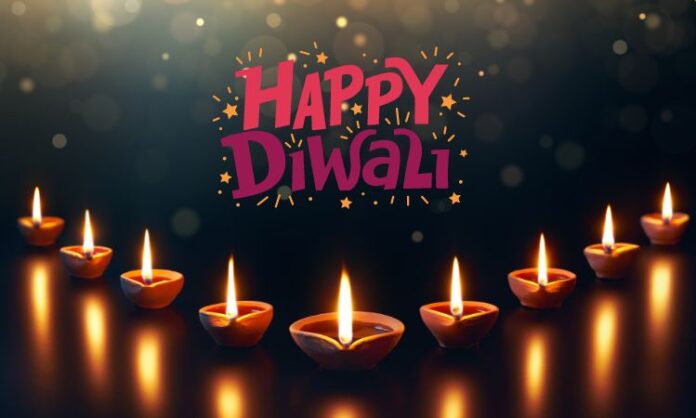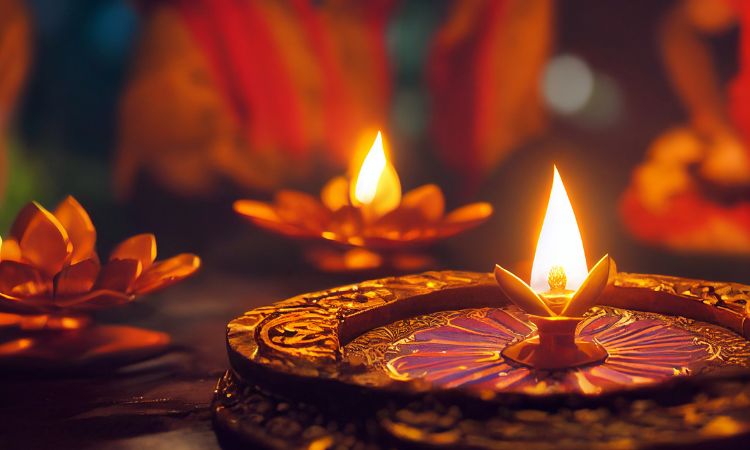One of the most eagerly and enthusiastically looked-forward-to festivals in India, known as Deepawali, Diwali 2024 is based on very ancient Hindu traditions and therefore has become known as the “Festival of Lights” and symbolizes the victory of light over darkness, good over evil, and knowledge over ignorance.
There are five days of celebrations because every day has its significance and set of rituals. This festival holds paramount importance in cultures, spiritual aspects, and social values due to the joining of millions from different regions, faiths, and backgrounds.
Preparations have already started everywhere in India and the world to celebrate Diwali 2024. All look forward to this year’s festival, close to heart and mind, to remind everyone of the warmth, unity, and positivity it brings. Let’s get deeper into the culture and celebrations of Diwali and some key details for 2024 – “Diwali pooja time” and “Diwali 2023 date in India calendar”.
For happy Diwali wishes click here :
What is Diwali and its Meaning?
Deep-rooted in Hindu mythology is happy Diwali, more widely known as the “Festival of Lights.” The name “Diwali” is derived from the Sanskrit word “Deepavali,” which is interpreted as “row of lights” or “array of lamps.” This is the festival celebrating the homecoming of Lord Rama, his wife Sita, and brother Lakshmana to Ayodhya after 14 years of exile. This was according to the great Hindu epic Ramayana in which Ayodhya citizens lit rows of oil lamps, or diyas, during the festivity of their lord returning home and the defeat of the demon king Ravana.
Diwali is not only the return of Lord Rama but also the defeat of good over evil and light over darkness. This theme resonates in many different stories and legends related to Diwali, like the worship of Goddess Lakshmi, the deity of wealth and prosperity, and Lord Ganesha, the remover of obstacles.
Diwali Festival Dates in 2024 and Key Rituals
Diwali is a five-day festival, and each day has its special importance:
Dhanteras (Day 1): On this day, people worship Lord Dhanvantari, the God of Ayurveda, and Goddess Lakshmi. The very tradition involves buying gold, silver, or utensils to welcome prosperity into one’s home.
Day 2: Naraka Chaturdashi It is known as Chhoti Diwali. It is celebrated by reciting the victory tale of Lord Krishna over the demon Narakasura. People light oil lamps to remove darkness and negativity in their lives.
Day 3: Diwali This is the final day of the festival when people do Lakshmi Pooja, light diyas, decorate homes with rangoli (colorful patterns), and burst firecrackers. It is also time for exchanging sweets and gifts with near and dear ones in the form of spreading happiness and good fortune. Conventionally, the best time to perform pooja on Diwali should be after sunset. Traditionally, in Hindu tradition, Lakshmi Pooja needs to be performed in the Pradosh Kaal, when dusk falls and before Amavasya Tithi, the new moon.
Govardhan Puja (Day 4): It is the celebration of how Lord Krishna saved the people of Gokul by lifting Mount Govardhan to save them from torrential rains.
Bhai Dooj (Day 5): The last day is the celebration of the bond between brothers and sisters. Sisters are given a ritual for the well-being of their brothers, who, in turn, give gifts and blessings.
Diwali this year is going to be very well celebrated, and the same holds true for other countries as well. Based on the lunar calendar, it will surely take place at the end of October, and the beginning of November in 2024.
Dewali celebrations: Traditions and Customs
A variety of rituals and customs define Diwali, which differs from region to region but shares a common theme of reverence to deities, lighting up homes, and seeking prosperity and happiness.
Perhaps the most popular activity that takes place for Diwali, the earthen lamps, is lighting diyas. Families light these oil lamps and take them inside as well as outside their houses, thus signifying the spreading away of darkness and divine light into the homes. The diyas work as a guide to Goddess Lakshmi, calling upon her blessings into one’s home.
The entrance of homes is also seen with the beautiful rangolis of intricate patterns designed with vibrant colors. Such rangolis can be made out of powdered colors, rice flour, or flower petals. In the belief of many, rangoli designs attract good fortune and better energy in the household.
Bursting firecrackers Fireworks form a part and parcel of Diwali celebrations. They always symbolize the smashing victory of good over evil light over darkness. Again, this provides audio stimuli and visuals that drive away evil spirits, while the visuals are relished by all age groups.
Sharing Sweets and Gifts: Socializing comes with Diwali as, due to the affection of the people, sweets and gifts are shared among others. Indian sweet dishes like laddoos, barfis, and jalebis are prepared and distributed in homes, among members, friends, and neighbors.
Diwali kab hai:
The festival of lights, Diwali 2024 date, is on Friday, 1st November 2024. It is believed to be the most important Diwali day when Laxmi Puja is done. It begins with Dhanteras on October 29, 2024, and ends with Bhai Dooj on November 3, 2024. Diwali lasts for six days, starting from October 28, 2024, with all days having their importance, such as Govardhan Puja and Laxmi Puja, which takes place on the Amavasya night.
Lakshmi Pooja:
Goddess Lakshmi is the deity of wealth and prosperity, and the most important rite of Diwali is indeed Goddess Lakshmi’s worship. Families observe Lakshmi Pooja in the evening to seek her blessings for the next year. Special offerings prayers and mantras form a part of the Pooja, and cleaning and decorating the house is considered a high point as preparation to welcome Goddess Lakshmi.
Diwali Festival Across the Globe
Although Diwali is primarily celebrated in India, its popularity pervades the globe. Most countries have significant Indian populations; thus, it is undoubtedly a joyful celebration – in Nepal, Sri Lanka, Malaysia, Singapore, and Mauritius, among others.
Apart from South Asia, Diwali now reaches the UK, United States, Canada, and other Western countries and is often an official festival within certain regions. Major cities aglow with displays and events and the Indian diaspora observing traditional ceremonies share rich cultural heritage in return.
For many, Diwali becomes an opportunity to introduce Indian culture to others. It ensures greater understanding and unity among people. Festivals of Diwali are seldom seen without being celebrated in public spaces and even in schools, where different cultures come together to celebrate the meaning of the festival.
Diwali 2024: The Time for New Beginnings
When Diwali 2024 comes, many of us cannot but be filled with hope and eagerness. Diwali is a festival and more so: it is hope, renewal, and endless victory of good over evil. After the recent problems and trials, Diwali 2024 depicts a new beginning: an opportunity to reflect on values, reconnect with close relatives, and call positivity into our lives.
This Diwali will be bright because people are coming out of dark clouds. From here in India or elsewhere, it is time to gather people around, celebrate traditions, and enjoy the charm of Deepawali.
Wishing each other “Happy Diwali 2024,” we are not only wishing for a day’s happiness but throughout the year. The festival inspires us to become better, kind, and compassionate individuals, spreading light to every corner of our lives.
📆 Diwali 2023 Dates in India Calendor
For those interested in the dates of Diwali over previous years, Diwali 2023 falls on November 12, 2023. In terms of time, the early daybreak tradition generally falls after sunset in the evening during traditional times. “Diwali pooja time” will vary by location as it also depends upon the lunar calendar and the local traditional practices.
So if you are planning to celebrate Diwali this year or are merely curious about “Diwali kb ki ha,” remember it is not just about the date but the spirit of the festival that makes it special.
Conclusion:
Diwali 2024: Time to celebrate the light within every one of us and to give it out into the world. Traditions like lighting diyas, doing Lakshmi Pooja, and exchanging gifts and sweets might be heavy or overwhelming during Diwali. Either if one is celebrating back in India, in a distant land, may their Diwali come across with the doings of joy, prosperity, and peace.
Happy Diwali 2024!🎆













